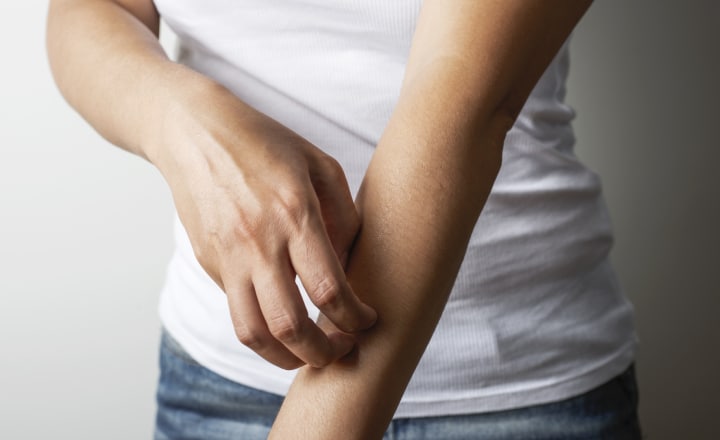Skin Rash and Hives
Did you know that allergies can also affect your skin? Read more about allergic skin rash or hives, the causes and how to find relief from symptoms.

What’s with this red, bumpy, itchy skin rash?
Many of us are familiar with the sneezing, runny nose, and itchy, watery eyes that come with hayfever, but did you know that allergies can also affect your skin? Red, bumpy, and itchy skin could mean that you are experiencing an allergic skin rash or hives. Read on to find out more about what can cause these skin reactions and what you can do to find relief from your symptoms.
What is an allergic skin rash?
An allergic reaction rash on your skin can occur when your skin comes into contact with a trigger – or allergen – that causes your body’s immune system to react. This reaction results in a red and itchy rash and is called allergic contact dermatitis. The skin rash may take a day or two to appear after your skin comes into contact with the trigger and will continue until after contact has stopped.
The most common trigger of allergic contact dermatitis is nickel metal, which is often found in jewellery or metal parts of clothing. Other common causes include plants and chemicals, as well as cosmetics, creams, and fragrances that are used on the skin.
What are hives and how did I get them?
Hives – which also go by the name urticaria in medical circles – are raised areas of skin. These itchy bumps or welts can be red or skin-coloured, and sometimes grow bigger and even merge together to form larger wheals.
Hives can form when your body’s immune system reacts to a particular trigger. This activates special cells in your skin called mast cells, which release a natural chemical called histamine that causes the itchy, red, bumps you see on your skin.
It’s important to know that while hives may look similar from person to person, the particular trigger can be different. Understanding what it is that causes your hives can help you avoid that trigger. Common triggers for hives include:
- Allergic reactions after your skin comes in contact with something you are allergic to, for example an animal or plant
- Allergic reactions to food, medicines, or insect bites or stings
- Viral infections, especially in children
- Physical factors, such as exposure of the skin to cold air or water, heat, vibrations, pressure, sweating, exercise, or scratching
While most cases of hives usually clear up within minutes or hours, some people can experience what’s called chronic hives – where hives occur on most days for more than six weeks. The specific cause or trigger of chronic hives is often not known, but typically not an allergy.
What can I do if I develop a skin rash or hives?
If you develop a skin rash or hives rash, it’s important to figure out if you can identify whether there was a specific cause. This way, you can do your best to avoid that particular trigger. If you are concerned about your symptoms, talk to your doctor. In some cases, a doctor may perform tests to identify skin allergies.
In addition to avoiding triggers, hives treatment can also include a medication called an antihistamine. Antihistamines work by blocking the body’s reaction when histamine is released during an immune response – helping to reduce the itchiness of a hives rash.
Demazin® Allergy + Hayfever Relief tablets contain loratadine – an antihistamine that can help relieve symptoms of chronic hives, including an itchy rash. Suitable for adults and children aged 12 years and older.
Frequently asked questions about skin rashes and hives
While both hives and allergic contact dermatitis both result in an itchy red rash on your skin, hives cause those areas of your skin to become raised into bumps or welts.
An allergic skin rash – or allergic contact dermatitis – is most commonly caused by an allergy to nickel metal, plants, chemicals, cosmetics, and fragrances.
Hives are an itchy rash that can look like raised red or skin-coloured patches of skin. Hives can range in size from tiny bumps to large welts bigger than the size of an adult hand!
Triggers for hives can include your skin coming into contact with an allergen such as an animal or plant, allergies to food, medications, or insect bites, infections, and physical factors such as cold, heat, pressure, or exercise.
Demazin® Allergy + Hayfever Relief tablets contain the antihistamine loratadine, which can help relieve the itchy rash associated with chronic hives.
AU-2022-11-0073
